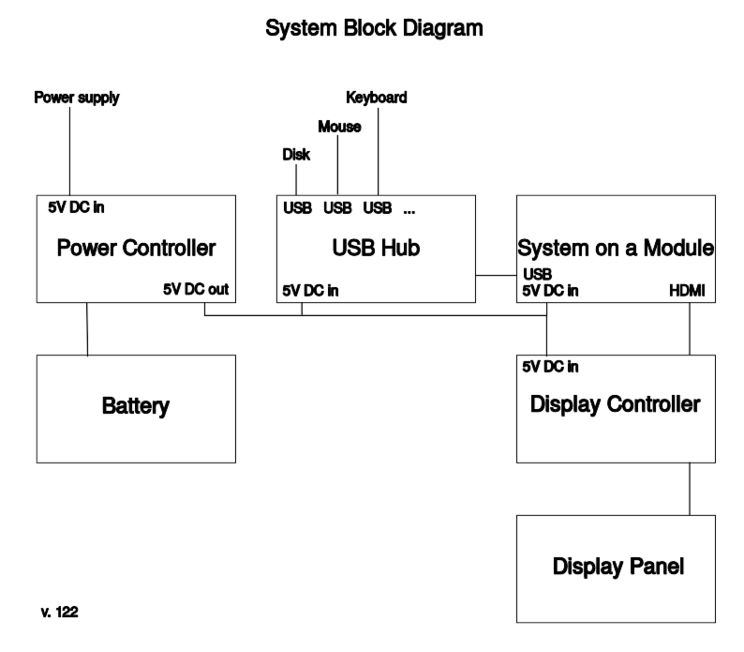Difference between revisions of "Schematics"
| Line 4: | Line 4: | ||
| − | [[ | + | [[Image:BalthazarBlockDia122.svg]] |
| − | |||
Balthazar laptop as a box consisting of: mainboard + all the perifery needed that make up a | Balthazar laptop as a box consisting of: mainboard + all the perifery needed that make up a | ||
complete laptop: display, audio, keyboard, mousepad, wireless, usb, hdmi... and additionally: a | complete laptop: display, audio, keyboard, mousepad, wireless, usb, hdmi... and additionally: a | ||
Revision as of 03:32, 5 March 2020
Schematics
We have an early Balthazar system scheme as a block diagram upon which we develop and prototype separate boards to an interchangable compliance.
 Balthazar laptop as a box consisting of: mainboard + all the perifery needed that make up a
complete laptop: display, audio, keyboard, mousepad, wireless, usb, hdmi... and additionally: a
buffered GPIO (general purpose in/out) connector (not that laptop usually needs it...).
The technology used benefits from the current rapid mobile platform development – as do all open-
source single-board computers:Banana Pi, Orange Pi 4 – and a bit more advanced Firefly-
RK3399. They all use SOC (system on chip) as the miniaturized combination of CPU/GPU etc. The
laptop should however be a pushed-up version of these single board computers - but still a single
board computer.
One format of recent computers is also the mini-pc. They are usually based on Intel or AMD laptop
computer processors. LattePanda seems to be on the side of single-board-computers but uses Intel
processors. Prices are also pushed up.
The interchangeable module should basically be the board itself, while the stable part should be the
skeleton: a specifically designed housing with display, keyboard, audio, mousepad, power supply.
To upgrade – one buys a new board and inserts it in the place of the old board.
Balthazar laptop as a box consisting of: mainboard + all the perifery needed that make up a
complete laptop: display, audio, keyboard, mousepad, wireless, usb, hdmi... and additionally: a
buffered GPIO (general purpose in/out) connector (not that laptop usually needs it...).
The technology used benefits from the current rapid mobile platform development – as do all open-
source single-board computers:Banana Pi, Orange Pi 4 – and a bit more advanced Firefly-
RK3399. They all use SOC (system on chip) as the miniaturized combination of CPU/GPU etc. The
laptop should however be a pushed-up version of these single board computers - but still a single
board computer.
One format of recent computers is also the mini-pc. They are usually based on Intel or AMD laptop
computer processors. LattePanda seems to be on the side of single-board-computers but uses Intel
processors. Prices are also pushed up.
The interchangeable module should basically be the board itself, while the stable part should be the
skeleton: a specifically designed housing with display, keyboard, audio, mousepad, power supply.
To upgrade – one buys a new board and inserts it in the place of the old board.